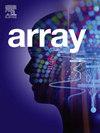Enhancing mental well-being: An artificial intelligence model for predicting mental disorders
IF 4.5
Q2 COMPUTER SCIENCE, THEORY & METHODS
引用次数: 0
Abstract
Pervasive mental health conditions like depression, stress, and anxiety significantly affect individual well-being. Early identification and understanding are critical to minimize their negative effects. This study explores how AI models can be leveraged for improved mental health assessment. We have introduced some machine learning classifiers along with a deep learning model. Among the applied ML classifiers, the ”Ensemble” approach aims to outperform individual models by harnessing their collective strengths. While data acquisition for mental health research can be challenging, we utilized a publicly available dataset from the Kaggle site, acknowledging potential limitations like data imbalances and missing values. This imbalanced dataset is balanced by the Random Oversampling model. In our study, we introduced a state-of-the-art approach to predicting mental conditions such as depression, anxiety, and stress. For every condition, we utilized three machine learning models: the K-Nearest Neighbors (KNN), Random Forest (RF), and Support Vector Machine (SVM), combining these models into an ensemble model where a Voting classifier is used in the ensemble model. We also applied the Artificial Neural network (ANN) as a deep learning model for each disorder. Though the ensemble model performed an excellent outcome, the ANN model found outstanding outcomes from all the models. The ANN model achieved the highest accuracy of 99.73% for depression, 99.89% for anxiety, and 99.39% for stress.
增强心理健康:预测精神障碍的人工智能模型
普遍存在的心理健康状况,如抑郁、压力和焦虑,会显著影响个人的健康。早期识别和了解对减少其负面影响至关重要。这项研究探讨了如何利用人工智能模型来改善心理健康评估。我们引入了一些机器学习分类器和一个深度学习模型。在应用的ML分类器中,“集成”方法旨在通过利用它们的集体优势来超越单个模型。虽然心理健康研究的数据获取可能具有挑战性,但我们利用了Kaggle网站上公开可用的数据集,承认数据失衡和缺失值等潜在局限性。这种不平衡的数据集通过随机过采样模型进行平衡。在我们的研究中,我们引入了一种最先进的方法来预测精神状况,如抑郁、焦虑和压力。对于每种情况,我们使用了三种机器学习模型:k近邻(KNN)、随机森林(RF)和支持向量机(SVM),并将这些模型组合成一个集成模型,其中在集成模型中使用了投票分类器。我们还应用人工神经网络(ANN)作为每种疾病的深度学习模型。虽然集成模型表现出优异的结果,但人工神经网络模型从所有模型中发现了出色的结果。人工神经网络模型在抑郁、焦虑和压力方面的准确率分别达到99.73%、99.89%和99.39%。
本文章由计算机程序翻译,如有差异,请以英文原文为准。
求助全文
约1分钟内获得全文
求助全文

 求助内容:
求助内容: 应助结果提醒方式:
应助结果提醒方式:


